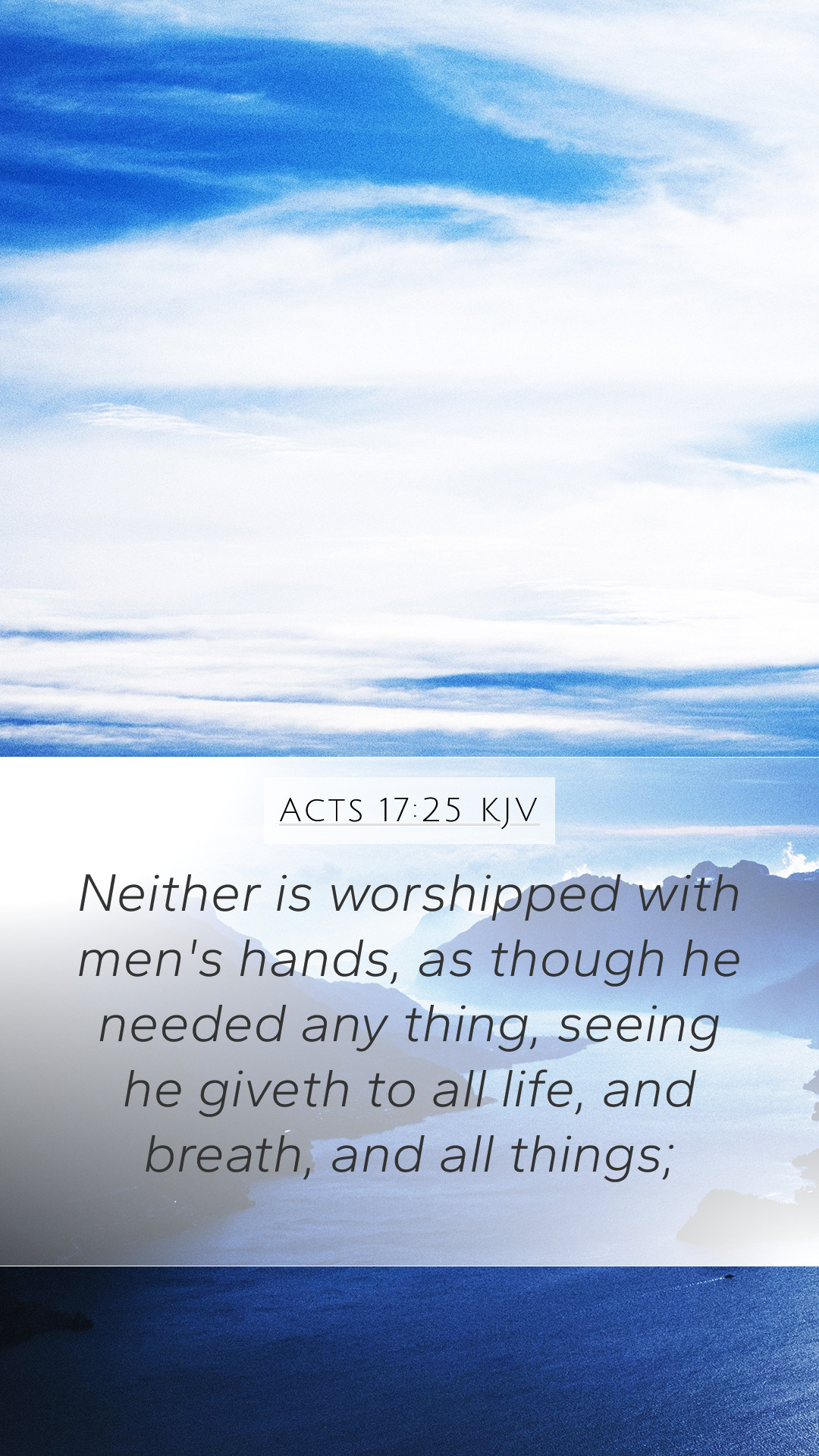Understanding Acts 17:25: An In-Depth Bible Verse Analysis
Acts 17:25 reads: "Neither is worshipped with men's hands, as though he needed anything; seeing he giveth to all life, and breath, and all things." This verse is rich in theological significance and speaks to God's nature and self-sufficiency. Below is a summarized meaning of this scripture combining insights from renowned public domain commentaries.
Bible Verse Meaning
This verse is part of Paul’s sermon to the Athenians, where he emphasizes the greatness of God compared to the idols worshipped in Greece. Here, the verse clarifies that God does not require anything from humans, as He is the giver of all life and resources. This underscores the idea of divine sovereignty and the self-sustaining nature of God.
Commentary Insights
- Matthew Henry: He highlights that God is not dependent on human effort or service, noting that worshipping God through physical means, such as temples and altars, is inapplicable as He exists beyond these. He emphasizes that God’s greatness and independence make Him beyond human comprehension.
- Albert Barnes: Barnes interprets the verse to mean that God, being a spirit, is not confined to physical manifestations. He explains that God does not 'need' the assistance of humanity, as He is the source of life itself. Barnes connects this to the broader theme of God’s providence and care for creation.
- Adam Clarke: Clarke elaborates on the giving nature of God, asserting that everything that sustains human life comes from Him. He stresses God's role as a benefactor to all, providing not just physical sustenance but also spiritual life. Clarke shows the implications of this verse for understanding God's character.
Key Themes in the Verse
Several pivotal themes emerge from Acts 17:25:
- God's Self-Sufficiency: The assertion that God does not need anything from humanity emphasizes His independence and sufficiency, contrasting starkly with the false gods the Athenians worshiped.
- The Nature of True Worship: The verse invites readers to reconsider notions of worship that involve material offerings or demands, redirecting focus onto a spiritual understanding of God.
- God as Provider: This text reinforces that God is the origin of all life and sustenance, encouraging believers to recognize His role in their everyday existence.
Biblical Exegesis of Acts 17:25
To fully grasp the meaning of this verse, it's essential to consider its place within the entire chapter. Paul, during his visit to Athens, encounters a city filled with idols. His teachings in this discourse are aimed at dismantling idolatry. By declaring that God does not require worship through human hands, Paul contends that idolatry cannot encapsulate the divine essence.
Cross References
Acts 17:25 is related to several other scriptures that expand on its themes:
- Isaiah 40:28: “Hast thou not known? hast thou not heard, that the everlasting God, the Lord, the Creator of the ends of the earth, fainteth not, neither is weary?”
- John 4:24: “God is a Spirit: and they that worship him must worship him in spirit and in truth.”
- Psalm 50:12: “If I were hungry, I would not tell thee: for the world is mine, and the fullness thereof.”
Applying Bible Verse Insights to Daily Life
Understanding Acts 17:25 may lead believers to reflect on their worship practices and their understanding of God. Recognizing that God does not need our offerings can liberate individuals to engage with Him in a more genuine manner.
Common Questions and Interpretations
Many search for the meaning of this verse with questions such as:
- What does Acts 17:25 mean?
- What is the significance of God's sufficiency as presented in this verse?
- How can this verse be applied in modern worship practices?
Conclusion
Acts 17:25 serves as a profound reminder of God's nature as self-sufficient and the giver of life. From this understanding, believers can derive valuable insights for personal worship and community practices. By engaging with such verses through Bible study groups or online Bible study resources, individuals can deepen their comprehension of scripture and its implications for their lives.
Further Study Recommendations
For those wishing to delve deeper into this verse, consider utilizing the following Bible study guides:
- Bible study plans focusing on the Book of Acts
- Courses on the nature of God and worship
- Materials that explore New Testament teachings on idolatry and divine sovereignty


